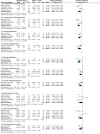The Cerebellar Cognitive Affective Syndrome-a Meta-analysis
- PMID: 31392563
- PMCID: PMC6761084
- DOI: 10.1007/s12311-019-01060-2
The Cerebellar Cognitive Affective Syndrome-a Meta-analysis
Abstract
The cerebellar cognitive affective syndrome (CCAS) was first described by Schmahmann and Sherman in 1998. Despite their clear depiction of the syndrome, it is our experience that the CCAS has not yet found solid ground as a disease entity in routine clinical practice. This made us question the dimension of the CCAS in cerebellar patients. We performed a systematic review of the literature according to the PRISMA guidelines, in order to answer the question whether patients with acquired isolated cerebellar lesions perform significantly worse on neuropsychological testing compared to healthy controls. Studies were selected based on the predefined eligibility criteria and quality assessment. The systematic search resulted in ten studies, mainly observational cohorts consecutively including adult patients with isolated cerebellar lesions. Patients were compared to healthy controls, and neuropsychological investigation was done within one year of diagnosis. Meta-analysis of the twelve tests that were done in two or more studies showed that cerebellar patients perform significantly worse on Phonemic Fluency, Semantic Fluency, Stroop Test (naming, reading and interference), Block Design test and WMS-R visual memory. Cerebellar patients have significant and relevant deficits in the visuospatial, language and executive function domain. This meta-analysis therefore emphasizes the importance of the cerebellar cognitive affective syndrome as described by Schmahmann and Sherman.
Keywords: Affection; CCAS; Cerebellar cognitive affective syndrome; Cerebellum; Executive function; Language; Neuropsychological tests; Visuospatial.
Conflict of interest statement
The authors declare that they have no conflict of interest.
Figures
References
-
- Schmahmann JD, Sherman JC. The cerebellar cognitive affective syndrome. Brain. 1998;121(Pt 4):561–579. - PubMed
-
- Schmahmann JD, Pandya DN. Anatomical investigation of projections to the basis pontis from posterior parietal association cortices in rhesus monkey. J Comp Neurol. 1989;289(1):53–73. - PubMed
-
- Richter S, Gerwig M, Aslan B, Wilhelm H, Schoch B, Dimitrova A, Gizewski ER, Ziegler W, Karnath HO, Timmann D. Cognitive functions in patients with MR-defined chronic focal cerebellar lesions. J Neurol. 2007;254(9):1193–1203. - PubMed
Publication types
MeSH terms
LinkOut - more resources
Full Text Sources
Medical




